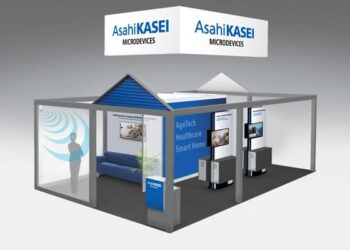Global standardization has been one of the key trendsin the Japanese pharmaceutical industry over the past decade.This has been shapedby the revision of the Japanese pharmaceutical affairs law, acquisitions of Japanese companies by overseas players, and the expansion of the generic drug market. This trend will be further accelerated by Japan’s joining PIC/S last year. It is becoming even more important for Japanese companies to build closer cooperation with international partners who can provide them with competitive products, technologies and services in order to survive against international competitions.
In parallel with the growing importance of international cooperationwithin the industry, the CPhI Japan exhibition and its four parallel events – constitutingthe largest and most international annual gathering of the pharmaceutical industry in Japan – has become an indispensable opportunity to meet new partners and forge new relationships. Last year thesefive integrated pharma events attracteda record-breaking17,000 visitors. This year there will be 500 exhibiting companies from 30 countries and regions, the biggest number of participantsever making it the largest exhibition so far.
“Insight into Open Innovation Strategies of Japanese Pharmaceutical Companies” to be heldincooperation with
the Japan Pharmaceutical Manufacturers Association
A reduction in theamount of time needed to evaluate new drugs for official approval in Japan has led to foreign pharmaceutical manufacturers, who at one stage were closing their research bases in Japan, to now reestablishR&D centers and increase their investments. Meanwhile,the Japan Agency for Medical Research and Development (AMED), a national research and development corporation, will be established in April 2015 to serve as a “control tower” for medical R&D activities, one of the main pillars of Prime Minister Abe’s growth strategy. Thus in the Japanese scene of new drug creation, the whole industry is increasingly looking forward to an improved environment for new drug development.
With the tide of the industry running in this new direction, on April 24, the third day of this year’s CPhI Japan, “Insight into Open Innovation Strategies of Japanese Pharmaceutical Companies” will be held on the theme of “Encouragement of Innovation for Quality Improvement of and Contribution to Economic Development by Medical Care”, which is positioned as one of the main themes of the activities of the Japan Pharmaceutical Manufacturers Association (JPMA). This program will start with a lecture by Professor Makoto Suematsu, Dean of the School of Medicine, Keio University and teaching in its Biochemistry Department, who will become the first president of the Japan Agency for Medical Research and Development (AMED).His speech will be followed by lectures by experts from Shionogi & Co., Ltd., Daiichi-Sankyo Co., Ltd., Astellas Pharma Inc. and Takeda Pharmaceutical Co., Ltd., who willreveal what theircompanies are doing in pursuit of open innovation.
WithUse of Generic Drugs Promoted in 10-Year Perspective,
More API Suppliers from China, India and Korea are Exhibiting
With interest in more active development of new drugs rising in Japan, one of the major reasons for the increased exhibit space of CPhI Japan must be the expansion of the market for generic drugs.
A target of a 60% share for generic drugs, proposed in the April 2013 road map announced by the Ministry of Public Health, Labour and Welfare, has been attained earlier than expected. This is but one example of the expanding trend of the generic drug market. Meanwhile, the three major foreign groups of exhibitors including China, Korea and India have significantly expanded their presencein this year’s show. From Europe, in addition to Spain exhibiting for the first time, Italy continues to hold a steady position among active pharmaceutical ingredients (API) suppliers to Japan will expand its pavilion size this time.Foreign suppliers are clearly expecting a new rise in API demand.
On the afternoon of April 22, the opening day of the exhibition, special speeches entitled “The Future Vision of Generic Drugs – after 10 years” will be given by Professor Masaki Muto, Representative Director of the Japan Society of Generic Medicines, and Mr. Katsufumi Jo, Director of the Economic Affairs Division, Health Policy Bureau, Ministry of Public Health, Labour and Welfare, who will discuss the current situation of and problems in the generic drug market in a 10-year perspective.
Initiatives for Steady API Supply to Japanese Market
Along with the expansion of the market for generic pharmaceuticals, the role of foreign suppliers of API is further increasing in importance. However, at the same time there is a fear that steady supply of API in the domestic market could be affected, as in an extreme case GMP auditing has declared the product at stake to be unacceptable, resulting in a supply stop of the pertinent API. Today, when such a situation prevails, foreign API manufacturers are called on to deepen their understanding of Japanese GMP standards and MF system, and on the other hand Japanese pharmaceutical manufacturers are urgently required to satisfy quality control standards in Japan and secure access to price-competitive API suppliers.
To address these problems of API supply and quality control head on, last year an international networking event to consider “Problem of Steady API Availability” was launched as a special eventatCPhI Japan and attracted more than 600 participants. This year’s edition will again bring together speakers from the Active Pharmaceutical Ingredients Committee (APIC) of Europe, the Korea Pharmaceutical Traders Association (KPTA), the China Chamber of Commerce for Import & Export of Medicines & Health Products (CCCMHPIE) and the Pharmaceuticals and Medical Devices Agency (PMDA), an independent administrative corporation, in Japan. The speakers will make proposals for problem solving regarding the common theme of steady API supply from their respective points of view.
Christopher Eve, President of UBM Japan, the organizer of the exhibition, comments: “Each yearCPhI Japan has enjoyed the participation of many foreign governments and trade associations, either as exhibitors or visitors. Today, with thestablesupply of APIs a major issue not only for generic drugs but also for new drugs and OTC drugs, I sincerely hope that this seminar, organised by the Japan Pharmaceutical Traders’ Association, will serve not only as an excellent opportunity for foreign API manufacturers to deepen their understanding of GMP research and the MF system in Japan but also as a step toward deeper mutual understanding between Japanese pharmaceutical manufacturers and the world market.”
Forefront of Pharmaceutical Industry
Over 150 Seminars to Discuss Process Chemistry,
Regenerative Medicine, Drug Formulation Technology, etc.
More than 150 seminar sessions will be held alongside CPhI Japan this year. The seminar program, which attractsaround 6,000 persons from the industry, is one of the most attractive features of CPhI Japan. In addition to the seminars are already mentioned above, there will be the Process Chemistry Seminar held in cooperation withthe Japanese Society for Process Chemistry on the themes of greater efficiency of manufacturing processes and quality control, covering a full range of products from low to high molecular weight, the Biopharma Seminar centering on regenerative medicine, which is expected to bring about a significant expansion of the market. In addition, the InnoPack Japan Conference will discuss “drug formulation technology”, “packaging technology” and “proposals on pharmaceutical packaging technology from scenes of medical care practice.”
From 9:30 on April 22, the opening day, a keynote address will be delivered by Mr. Kazuhiko Mori, Director of the Evaluation and Licensing Division, Pharmaceutical and Food Safety Bureau, Ministry of Public Health, Labour and Welfare, who will introduce actions taken to get away from the blockbuster model and to work out a new strategy for new drug development. Another keynote address will be given by Mr. MasafumiNogimori, President of the Federation of Pharmaceutical Associations of Japan (concurrently Chairman of Astellas Pharma Inc.), who will introduce the role of the Japanese pharmaceutical industry in realizing a healthy and long life society under the title of “Toward Sustainable Growth of Pharmaceutical Industry”.
InnoPack Japan 2015 DDS and Packaging Innovation debuts
Drug delivery systems (DDS) are a focus of attention as a technique for maximizing the effectiveness of pharmaceuticals. The global market for DDS is estimated to be worth \15 trillion and growing steadily. Pharmatec Japan, an exhibition serving the field of this DDS and primary packaging until last year, is now renamed InnoPack Japan / DDS and Packaging Innovation for 2015, and has increased in display space.
According to the Ministry of Public Health, Labour and Welfare, one out of every six Japanese citizens is a diabetes patient, either currently or potential. As the demand for self-injection of insulin, one way of practical care against the disease, is now rising, this year’s InnoPack Japan will see introduction of latest devices for the growth market, including glass syringes, prefilled syringes and needles, by such major Japanese syringe makers as NIPRO, Terumo and Taisei Kako together with foreign exhibitors including Becton, Dickinson and Company and West Pharm.
Also, the InnoPack Japan conference mentioned earlier is focusing on “user-friendliness,” an aspect now attracting note, in addition to drug formulation technology interlocked with new drug development. Seminars to discuss the convenience of drug packaging and self-injection from the patient’s point of view, such as “What is the type of packaging that a patient with trouble using his or her hands can open with little force?” and “How a drug should be marked to prevent senior patients from taking it in a wrong way?” are targets of interest.
LAB WORLD Japan Newly Set Up in P-MEC Japan
The Pharmaceutical Machinery and Equipment Convention (P-MEC) is an international event for equipment and technology for the pharmaceutical industry, regularly held in conjunction with CPhI in major drug markets in the world. P-MEC Japan is closely interlocked with CPhI Japan by focussingon equipment and machinery for R&D of API and intermediates.This year’s edition augmented with the concept of LAB WORLD, a Europe-originating exhibition of analytical equipment for drug development, will display products that can more powerfully back up R&D and manufacturing specialists in pharmaceutical and other chemical companies.
The exhibition will be accompanied by the JAIMA Seminar presented by the Japan Analytical Instruments Manufacturers’ Association and an educational program “Practical Training Seminar for Analysis Technology” intended for persons with practicalduties. Their contents will be full of application know-how on latest equipment, such as “Liquid ChroColumn”, “LC-MS(MS)” and “Basics of Validation”, indispensable for their intended audience. This aspect exemplifies interlocking between the exhibition and the seminars.
CPhI Women: New Program to Support Networking
for Ladies Working in Drug Industry
As a new program atCPhI Japan 2015, “CPhI Women” will be held on April 22, the first day of the exhibition. According to UBM Japan’s President Christopher Eve, “Opportunities for women to play active roles are further increasing in the Japanese pharmaceutical industry, especially in the areas of drug regulatory affairs, quality control and research. However they tend to havefewer opportunities than their male colleagues for networkingand information exchange across company borders. We hope that CPhI Japan can offer a forum to facilitate networking by women in this industry, and we hope thatCPhI Japan Women will provide opportunities for business communication directly linked to their daily jobs and for information exchange for better career development.”
This first edition of CPhI Women will feature a lecture entitled “Designing Career Options” by Ms. Kuniko Shoji, Director and Senior Executive Officer, General Manager of the Regulatory Affairs, Clinical Development Department, Terumo Corporation, who will discuss some of the issues that women problems are likely to encounter in their work and possible solutions. Following the lecture a informal networking exchange will be held.

















